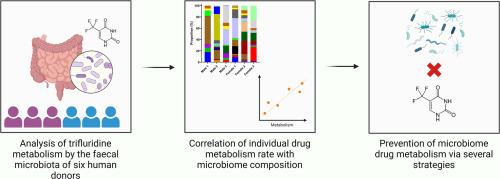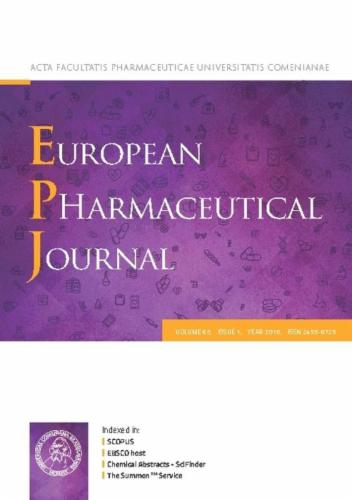Characterising and preventing the gut microbiota's inactivation of trifluridine, a colorectal cancer drug
IF 4.7
3区 医学
Q1 PHARMACOLOGY & PHARMACY
引用次数: 0
Abstract
The gut microbiome can metabolise hundreds of drugs, potentially affecting their bioavailability and pharmacological effect. As most gut bacteria reside in the colon, drugs that reach the colon in significant proportions may be most impacted by microbiome metabolism. In this study the anti-colorectal cancer drug trifluridine was used as a model drug for characterising metabolism by the colonic microbiota, identifying correlations between bacterial species and individuals’ rates of microbiome drug inactivation, and developing strategies to prevent drug inactivation following targeted colonic delivery. High performance liquid chromatography and ultra-high performance liquid chromatography coupled with high resolution tandem mass spectrometry demonstrated trifluridine's variable and multi-route metabolism by the faecal microbiota sourced from six healthy humans. Here, four drug metabolites were linked to the microbiome for the first time. Metagenomic sequencing of the human microbiota samples revealed their composition, which facilitated prediction of individual donors’ microbial trifluridine inactivation. Notably, the abundance of Clostridium perfringens strongly correlated with the extent of trifluridine inactivation by microbiota samples after 2 hours (R2 = 0.8966). Finally, several strategies were trialled for the prevention of microbial trifluridine metabolism. It was shown that uridine, a safe and well-tolerated molecule, significantly reduced the microbiota's metabolism of trifluridine by acting as a competitive enzyme inhibitor. Further, uridine was found to provide prebiotic effects. The findings in this study greatly expand knowledge on trifluridine's interactions with the gut microbiome and provide valuable insights for investigating the microbiome metabolism of other drugs. The results demonstrate how protection strategies could enhance the colonic stability of microbiome-sensitive drugs.

研究肠道微生物群对大肠癌药物三氟尿苷的灭活特性并加以预防。
肠道微生物群能代谢数百种药物,可能会影响药物的生物利用度和药理作用。由于大多数肠道细菌居住在结肠中,因此大量进入结肠的药物可能受微生物群代谢的影响最大。在这项研究中,抗结直肠癌药物曲氟尿苷被用作模型药物,用于描述结肠微生物群代谢的特征,确定细菌种类与个体微生物群药物失活率之间的相关性,并制定策略防止药物在结肠靶向给药后失活。高效液相色谱法和超高效液相色谱法结合高分辨率串联质谱法证明,来自六名健康人的粪便微生物群对曲氟苷进行了多变和多途径的代谢。在这里,首次将四种药物代谢物与微生物组联系起来。人类微生物群样本的元基因组测序揭示了它们的组成,这有助于预测个体供体的微生物对曲氟啶的灭活作用。值得注意的是,产气荚膜梭菌的丰度与微生物群样本 2 小时后灭活三氟尿苷的程度密切相关(R2 = 0.8966)。最后,试验了几种防止微生物代谢三氟尿嘧啶的策略。结果表明,尿苷作为一种安全且耐受性良好的分子,可作为一种竞争性酶抑制剂,显著降低微生物群对三氟尿苷的代谢。此外,研究还发现尿苷具有益生作用。这项研究的发现大大扩展了人们对曲氟啶与肠道微生物群相互作用的认识,并为研究其他药物的微生物群代谢提供了宝贵的见解。研究结果表明,保护策略可以提高对微生物敏感的药物在结肠中的稳定性。
本文章由计算机程序翻译,如有差异,请以英文原文为准。
求助全文
约1分钟内获得全文
求助全文
来源期刊
CiteScore
9.60
自引率
2.20%
发文量
248
审稿时长
50 days
期刊介绍:
The journal publishes research articles, review articles and scientific commentaries on all aspects of the pharmaceutical sciences with emphasis on conceptual novelty and scientific quality. The Editors welcome articles in this multidisciplinary field, with a focus on topics relevant for drug discovery and development.
More specifically, the Journal publishes reports on medicinal chemistry, pharmacology, drug absorption and metabolism, pharmacokinetics and pharmacodynamics, pharmaceutical and biomedical analysis, drug delivery (including gene delivery), drug targeting, pharmaceutical technology, pharmaceutical biotechnology and clinical drug evaluation. The journal will typically not give priority to manuscripts focusing primarily on organic synthesis, natural products, adaptation of analytical approaches, or discussions pertaining to drug policy making.
Scientific commentaries and review articles are generally by invitation only or by consent of the Editors. Proceedings of scientific meetings may be published as special issues or supplements to the Journal.

 求助内容:
求助内容: 应助结果提醒方式:
应助结果提醒方式:


